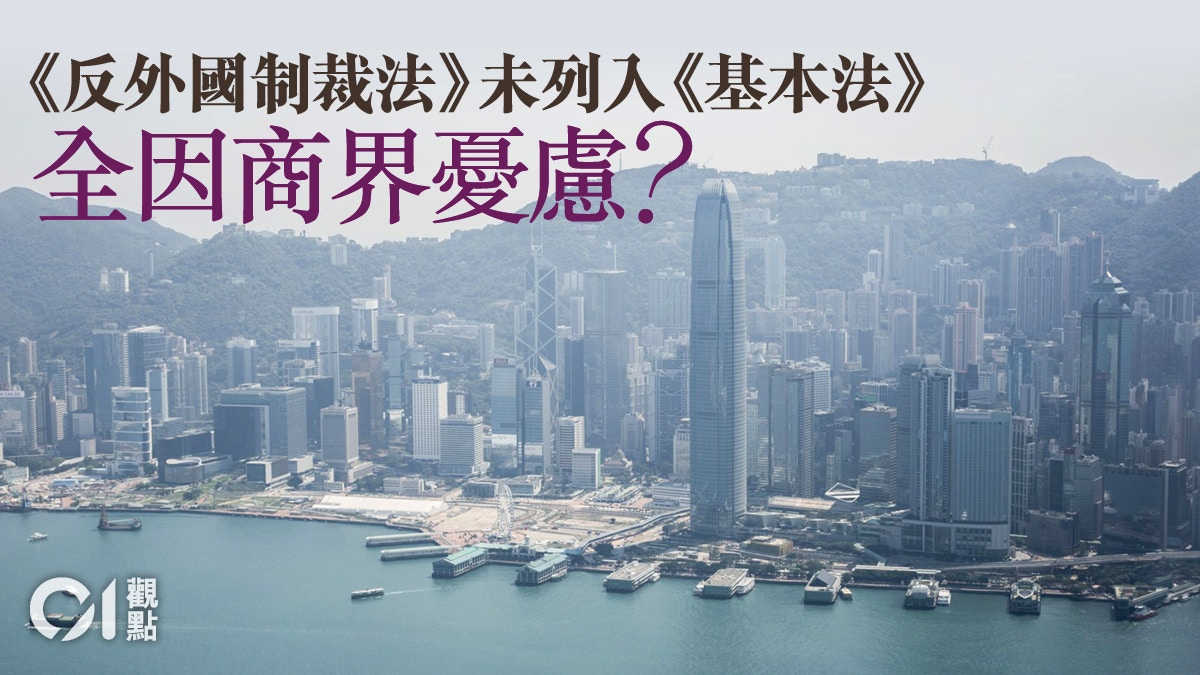Last Friday (August 20), the 30th meeting of the Standing Committee of the Thirteenth National People's Congress closed. The result was not as expected by the outside world to include the country’s Anti-Foreign Sanctions Law in Annex III of Hong Kong’s Basic Law.
A member of the Standing Committee, Tan Yaozong, who was present, pointed out that this is "The chairmen's meeting decided not to vote for the time being and continue to study the relevant issues... I believe this will make the Anti-Foreign Sanctions Law more effective", and the main comments are that the incident reflects Beijing. Taking into account the concerns of foreign companies in Hong Kong, the original plan was temporarily suspended to collect more opinions, and a plan to exempt certain multinational companies from complying with the regulations may be designed.
The Anti-Foreign Sanctions Law was passed at the last meeting of the Standing Committee of the National People’s Congress in June this year. It allows relevant departments of the State Council to take countermeasures against individuals and organizations that impose “discriminatory restrictive measures” against China, including refusal to issue visas. , Entry denied, visa cancellation, deportation, seizure of assets, seizure of property, prohibition of activities, etc. In addition, Article 14 of the law also stipulates that "any organization or individual who fails to implement or cooperate in the implementation of countermeasures shall be investigated in accordance with the law. Liability", but did not clearly state the form in which such legal responsibilities will be implemented.
The specific penalties are unclear
Like other counter-insurance laws in China in the past, the Anti-Foreign Sanctions Law does not provide specific penalties for violations. This is one of the reasons why companies are worried.
Taking fines as an example, the Ministry of Commerce of China issued the "Regulations on the List of Unreliable Entities" and the "Measures for Blocking the Improper Extraterritorial Use of Foreign Laws and Measures" in September last year and January this year. Foreign entities included in the list of unreliable entities...should be fined according to the severity of the circumstances.” Article 13 of the latter stipulates that “Chinese citizens, legal persons, or other organizations that fail to truthfully report the relevant situation in accordance with the regulations or fail to comply with the prohibition... may be subject to the circumstances. "Severe fines are imposed." Neither of them provided an upper limit on the amount.
On August 20, the 30th meeting of the Standing Committee of the Thirteenth National People's Congress closed. The draft of the Anti-Foreign Sanctions Law to be included in Annex III of the Hong Kong and Macau Basic Law was not voted on.
(Xinhua News Agency)
On the other hand, although the United States has a wide range of laws and regulations related to sanctions, there is still a clearer statement about the results of violations of sanctions measures.
For example, the United States has successively passed the Hong Kong Human Rights and Democracy Act, the Hong Kong Autonomy Act, and the Uyghur Human Rights Policy Act to sanction some Chinese and Hong Kong officials and enterprises. The contents of these all refer to the provisions of Article 206 of the International Emergency Economic Power Act. Several fines for violators are capped-civil penalties are capped at 250,000 U.S. dollars or twice the transaction cost for violation of sanctions, and criminal penalties are capped at 1 million U.S. dollars.
Therefore, under the same scenario of violating sanctions measures, companies will naturally have a higher degree of control over the risks of violating U.S. measures than violating Chinese measures.
Stand aside in a dilemma
Moreover, the use of the Anti-Foreign Sanctions Act itself means that foreign countries have already imposed sanctions on Hong Kong. Foreign-invested enterprises in Hong Kong need to choose one of the two in complying with and violating the US's "discriminatory restrictive measures" against China.
Since the U.S. dollar still occupies a dominant position in international market transactions, most international banks and companies in Hong Kong are expected to try their best to comply with the sanctions imposed by the United States.
In the past, Hong Kong's regulatory agencies and related laws did not pay special attention to financial sovereignty issues, but this environment has gone forever with the changes in the international situation.
How can regulators safeguard the interests of investors and actively defend financial sovereignty?
(Profile picture)
Of course, foreign companies cannot easily abandon the huge market in Hong Kong and even mainland China, and if they want, they are not unable to continue to find room for survival. For example, at the beginning of the year, State Street Global Investment announced that the Tracker Fund would suspend its investment in some Chinese companies. This executed the executive order of the US President, and the incident ended with the fund continuing to invest in Chinese-funded enterprises but changing the articles of association to restrict purchases by Americans.
The Hong Kong business community, especially foreign capital, has repeatedly expressed concerns. At this time, the Standing Committee of the National People’s Congress has not included the Anti-Foreign Sanctions Law in Annex III of Hong Kong’s Basic Law. Needs.
In the process, the Secretary of Justice and other SAR government officials should play an important role and fully communicate to avoid unnecessary negative effects from the implementation of the Anti-Foreign Sanctions Law.
HSBC's interest rate withdrawal, Tracker Controversy, why is financial instability in the Year of the Rat?
Improving fund management regulations to avoid the copying of the Tracker incident




